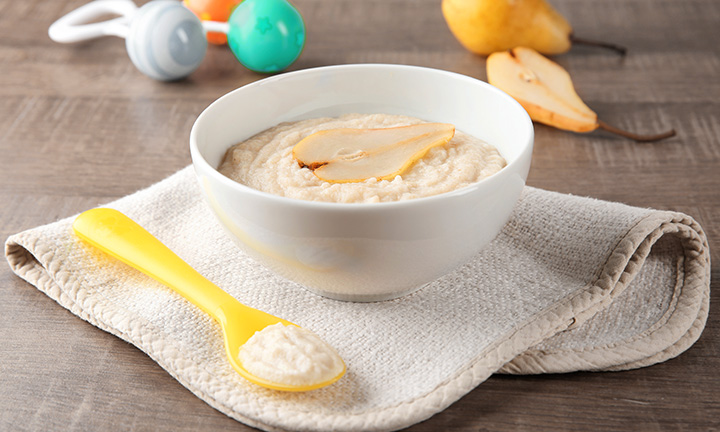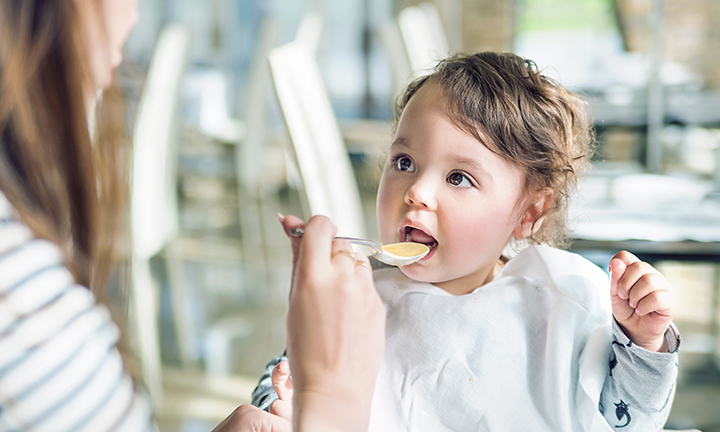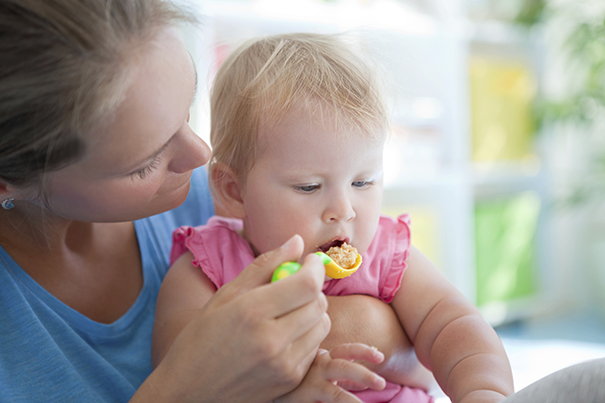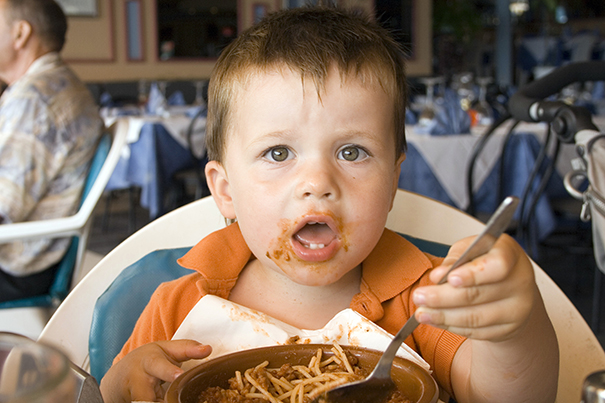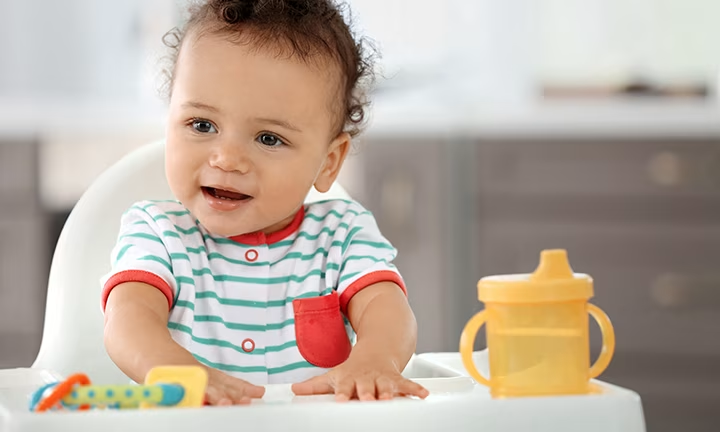
When Can Babies Have Water?
You might already know that newborn babies get all the fluid they need from breast milk or formula – but when it is OK to start giving your baby water? Read on to find out when you can give your baby water, how much water your baby should drink, how to start introducing water to your child.
At What Age Can You Give Your Baby Water?
If you’re exclusively breastfeeding your baby, he or she won’t need any water until you start introducing solid foods (usually from around 6 months of age).
Until then, your baby will get all the fluid he or she needs from your breast milk. In hot weather, you might notice that your baby wants more frequent feeds to stay nice and hydrated.
The same applies if you’re feeding your baby partly or exclusively with formula, although formula-fed babies can be given a little boiled water that’s then been re-cooled in hot weather.
In this case, though, only offer small quantities of water after your baby’s regular feeds to ensure he or she is well-fed and hydrated. Keep in mind that when your baby wakes in the night he or she will probably be hungry too, so offer formula first and then a little water.
Always speak to your health visitor or doctor if you’re in any doubt or if you think your baby might be in danger of becoming dehydrated.
How Much Water Should Your Baby Drink?
Your little one only starts needing water once you start introducing solid foods to his or her diet. This is a gradual process, so introducing water is gradual too.
Here’s a rough guide to how much water your baby should drink during each stage of the weaning process.
0-6 Months
For the first six months (until your baby starts eating solid foods) your child should get all his or her fluids from breast milk or formula.
Formula-fed babies may need water as part of their formula depending on the type of formula being given.
6-12 Months
When you start the process of weaning – that is, gradually introducing solid foods to your baby’s diet – you can also start to give your baby sips of water with meals.
When you give your baby water it’s best to use a regular (non-breakable) open cup or free-flow cup without a valve. A cup with an anti-spill valve could encourage your child to suck instead of learning how to sip. A free-flow cup is also better for your baby’s teeth.
During this stage of weaning, your child still gets most of his or her nutrients and fluids from breast milk or formula. Water still isn’t the main drink just yet.
At first, your infant is just getting used to water and drinking from a cup. As the proportion of solid foods increases, your baby will gradually need less and less milk for nourishment – and more water (or other extra fluids) to stay hydrated.
Over 12 Months
After the age of 12 months your baby will be drinking to quench his or her thirst, with most nutrients coming from food.
Between the ages of 1 and 4 years old – to avoid the risk of dehydration – children need to drink around 900 millilitres to 1 litre (6-7 cups) of fluid a day – that’s in addition to the fluid they get from foods like soup, fruit, vegetables and yoghurt.
This means water can now be one of your child’s main drinks – in fact it’s the best thing to offer your toddler when thirsty, as it doesn’t harm teeth and won’t spoil his or her appetite.
Of course, it’s fine to keep breastfeeding as well, for as long as you like if your baby still wants to and it fits in with your lifestyle. However, the breast milk won’t be your child’s main source of nutrients any longer.
As well as water, your 1-year-old should also drink at least 350 millilitres of whole cow’s milk a day – or at least 2 servings of dairy products like yoghurt or cheese – because of the calcium and other important minerals and vitamins it contains.
Keep in mind that semi-skimmed milk isn’t suitable for children until they’re at least 2 years old and growing normally – check with your health visitor or doctor before switching to reduced-fat milk.
If your baby has a lactose intolerance or a food allergy, or isn’t consuming dairy products for any other reason, calcium-fortified milk alternatives can be given instead from the age of 1.
Milk alternatives include soya, oat and almond milks. Rice drinks aren’t suitable for children under 5 years old, because they can contain too high a levels of arsenic for young children.
How Much Fluid Does Your Child Need Per Day?
In the table below you’ll find the recommended daily amounts of fluids per day according to age. Your baby, toddler or older child may need to drink more in hot weather.
How Much Fluid Does Your Child Need in a Day?
When Can Babies Drink Tap Water?
Tap water in the UK is safe for children and babies to drink, but you will need to boil it if your baby is under 6 months of age – for example, before using it to make up a bottle of formula.
After the age of 6 months it’s fine to give your child water from the tap without sterilising it. To sterilise tap water, bring cold water to a boil for a minute or so. Then, set it aside to cool to room temperature for about 30 minutes before using it. If you’re using the water to make up formula, only cool it to around 70 degrees Celsius before mixing in the powder. After this, leave it to cool further until it’s ready to drink. If you’re pressed for time, it’s OK to hurry the process along by standing the bottle in a bowl of cold water or holding it (with the lid on) under the cold tap. Always test the temperature of boiled and cooled formula or water on the inside of your wrist before giving it to your baby to prevent burns. Another tip is to always give the cooled water or formula a good shake to ensure there are no hot patches before testing a few drops on your wrist.
Should You Make Formula With Tap Water?
If you’re feeding your baby with formula, it’s OK to use tap water for making up feeds – in fact, it’s recommended.
Experts advise against using bottled water for making up formula because it may contain too much sodium (salt) or sulphate.
Be careful to follow the manufacturer’s guidelines on how much water to add, and always sterilise the water by boiling (and then cooling it) if your baby is less than 6 months old.
It’s important not to add too much or too little water to the powdered formula because
If Bottled Water Is the Only Option...
...for example, if you’re travelling in a region where tap water isn’t safe to drink, you’ll still need to boil the bottled water if your baby is under 6 months old. Also, check the label to make sure that the
What Should You Do if Your Baby Is Dehydrated?
It’s quite easy for babies and young children to become dehydrated, certain things can increase the risk of dehydration, including:
Common signs of dehydration include
If you suspect your child may be dehydrated, call your doctor or visit A&E straight away. Dehydration needs to be treated as soon as possible or it can become serious.
The Bottom Line
Your baby shouldn’t drink water until you start introducing solids at around 6 months of age. Even then – like so many other developmental milestones – the transition from breastmilk or formula to solids and water is a gradual process.
There might be a few spills to mop up as your little one gets the hang of using a cup, but those little accidents will soon be water under the bridge! Helping your baby learn new skills, like sipping from a cup, are all part of the magic of watching your child become more and more independent and capable.
- NHS: Drinks and cups for babies and young children
- NHS: Your baby's first solid foods
- NHS: Drinks for children up to 5
- NHS: Your breastfeeding questions
- NHS: Drinks and cups
- NHS: How to make up baby formula
- NHS: Formula milk: common questions
- NHS: Dehydration
- NHS: How can I keep my baby safe during hot weather?


